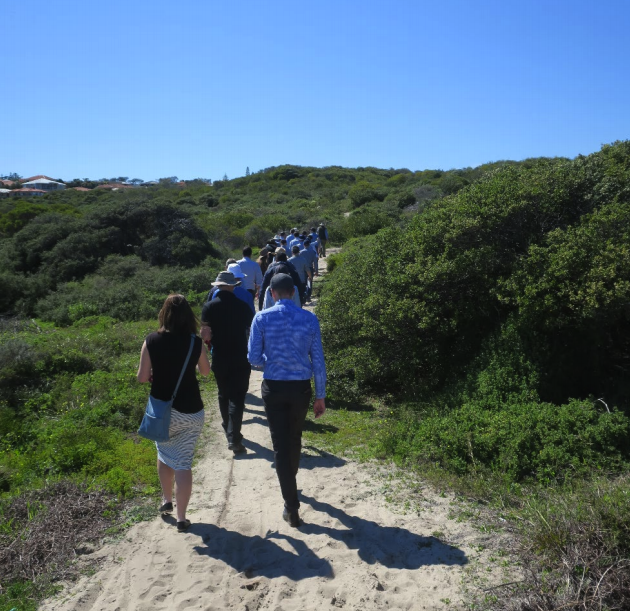WSC future for WA’s Ocean Reef Marina

Late in 2019, the CRCWSC partnered with DevelopmentWA and the City of Joondalup to identify ways to improve the water performance of the Ocean Reef Marina, as well as ideas to embed these outcomes in the development process.
The workshop is an example of our research synthesis program, in which we bring together stakeholders to collaborate on applying our research to real-life challenges.
The three high level challenges driving the need for the Ideas for Ocean Reef Marina workshop are:
- lack of a non-potable water supply
- need for an environmentally sustainable development to reflect the site’s location
- need for future proofing and resilience to physical and social changes.
We encouraged participants to focus on water outcomes, but to also consider integration opportunities across transport, energy, built form and other aspects of the project.
The goal was to help DevelopmentWA, as the developer, to consider:
- using alternative non-potable supply for public open space irrigation and boat wash-down
- managing stormwater to minimise environmental impacts
- using water and green infrastructure to create a pleasing microclimate
- innovatively using technology and sustainable infrastructure.
By working together and applying our research synthesis process, stakeholders co-designed 11 ideas to solve the challenges:
- Groundwater for irrigation – irrigating public open space with groundwater as part of a sustainable groundwater allocation
- Make water locally – meeting non-potable water demands from an on-site desalination or water recycling facility
- Buildings as clouds – considering rainwater harvesting during building design to provide a high quality water resource and a range of benefits
- Energy from waste on site – generating future energy through waste to energy wastewater treatment capability
- Cooling the hardstand – minimising heat from large areas of marina hardstand to be used for boats and trailers
- Adaptable parking that becomes future green space – growing the total area of green space over time as the changing use of cars reduces the need for parking spaces
- Innovation precinct – using boat trailer hardstand as the site of Ocean Reef Marina’s water factory, battery and other innovations
- Climate sensitive building design – using building orientation to provide shelter from winds and to create green refuge areas
- Mimic the dunal landscape on the built form – using dune landscape inspired green roofs to improve the energy efficiency of buildings
- East-west green corridors – using street swales to create green streets along an east–west alignment
- Greening by wicking – passively irrigating open space using wicking bed technology.
More about research synthesis
Ideas for Ocean Reef Marina demonstrates the CRCWSC’s innovative research synthesis approach, which introduces technical solutions, and fosters collaboration and integrated governance among the many stakeholders involved in city planning, infrastructure delivery and water environment protection. As we look beyond the CRCWSC (whose term expires in June 2021), we are creating an enduring legacy—the Water Sensitive Cities Institute—which will use the CRCWSC’s flagship research synthesis approach to support the ongoing adoption of water sensitive principles and practices.
For more information on the CRCWSC’s research synthesis process and ‘Ideas for’ workshops that led to this significant outcome for Ocean Reef Marina, contact our National Engagement Manager, Jamie Ewert (jamie.ewert@monash.edu).
You can watch our short video on our research synthesis process too.
More about Ocean Reef Marina
Ocean Reef Marina is located 35 minutes from the Perth CBD, and will be the third marina located in the north-western suburbs of Perth. There is strong demand in the area for additional boat parking as well as the ability to live adjacent to the Indian Ocean. The 65 ha marina development will include retail and dining establishments, public open space, residential development along with boat pens and stackers. Located between a Bush Forever site and the Marmion Marine Park, the environmental sustainability and future proofing of the site is of high importance.